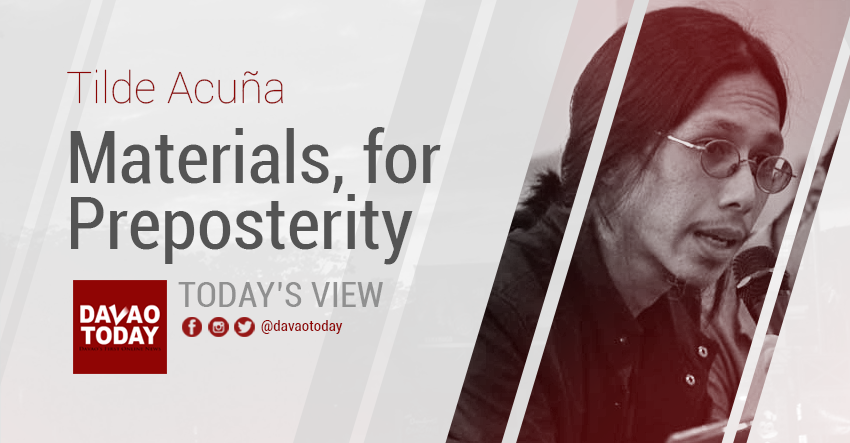Post-PUV-modernization, I suggest a museum for tourists that shall be called Phased-out Utility Vehicles Museum, or maybe Public Utility Transportation and Automobile Monument. Why flatten and weigh rusty scrap metals out of all jeepneys, when some topnotch models can preserve culture, evoke sentiment and turn feelings for the fallen icon into cash?
Author Archives: TILDE ACUNA
A few weeks ago, I inadvertently sparked among my social media contacts (and their contacts) a heated discussion about art, politics, alliances and cultural institutions; hence this attempt at making sense of the timely prairie fire, after the suffocating smoke settled, finally vanished and blended with the dissonant aroma of noise-air pollution. The wick: “ano ‘yang bringing back political theater, new protest poetry sa entablado? sinong huminto? kailan naging apolitical ang ahrt?” (What’s bringing back political theater, new protest poetry on stage? Who stopped? When has ahrt been apolitical?) Though far from the infernal flames of DDS-Dilawan troll war, firewood kept the thread ablaze for a few days, and I had to extinguish it and limit access; as of now, only those who chipped in comments and ideas regarding the new protest performance poetry shenanigans can reflect on their word choices and life decisions. As for me, no regrets so far.
I intended to begin with “Dear Students,” like an open letter, but that seems insincere. Most of you are not…
(Note: fill in the brackets and consider the parenthetical notes, such as this. This template is just a recommendation, thus democratic and not dogmatic.) I approve of the rally held last [date here] by activists (note: do not identify the group that organized the rally so non-aligned individuals cannot tell the difference and lump all activists in one category, as if homogenous), but I also suggest that they mobilize for causes and issues I find relevant. Slogans should be:
Progressive art works better once it serves functions outside galleries and museums. Same with protest poetry, once words step out…
By design and by default, enclosed concrete spaces heavily secured in built structures exclude. Insiders isolate themselves from the wild natural world outside. They validate each other’s truths and cement their beliefs, so they only receive dubious outsiders, who undergo security checks, satisfy decorum requirements and speak the language. Voices harmonize and synchronize to the point of unison, as if hearing a fellow insider’s voice is no different from hearing one’s own, conjuring delusions of grandeur and visions of the future under the industry they thought they have built with their own hands. Their noble vocation, essential. Their technological knowledge, absolute. Their corporate confidence, intact. Thus, they tremble and panic when proven wrong.
Translations indeed extend original texts, as if giving them afterlives that seem familiar. But upon further scrutiny, imprecisions and deviations surface,…
Before Buwan ng Wika ends, I published through my social media account “tokhang ang daigdig,” a poem rendered from Alejandro Abadilla’s “ako ang daigdig.” In every illuminating moment of replacing each of Abadilla’s ako with tokhang, the new work gradually forms and reveals itself as something relevant in these dark times, yet conscious of the limits of its being. I leave further reading and thinking up to those who want to dissect the derivative work, which, hopefully, has its own merits. So I can devote enough space to translation. Along the way, what Hans J. Vermeer calls skopos (aim) and/or commission (definition) shifted accordingly, that ended with the translatum (target text), “tokhang the universe.”
In this side of the world, people with right connections and privileged positions enjoy children’s rights; but children and minors from marginalized sectors don’t. They should be drug-free first and street-smart enough to deflect attempts of the authorities to plant incriminating evidence. Else, they suffer or die and boost the scores of the gamers, who acquire lives, keep an arsenal of cheat codes and brave a long game play that lets them win all the time.
If we have the penchant for patterns, we would probably notice that most years of our lives, we spend in
circuses, or carnivals—or peryas. Such funfairs are never fair and not incessantly fun. Upon further reflection
of our shared experiences, as cliché as it may sound, we derive lessons from these rides of life and learn to
move on to the next attraction; unless we take the machines from the owners, destroy ones that do not suit
our needs, take what remains and operate another system.

